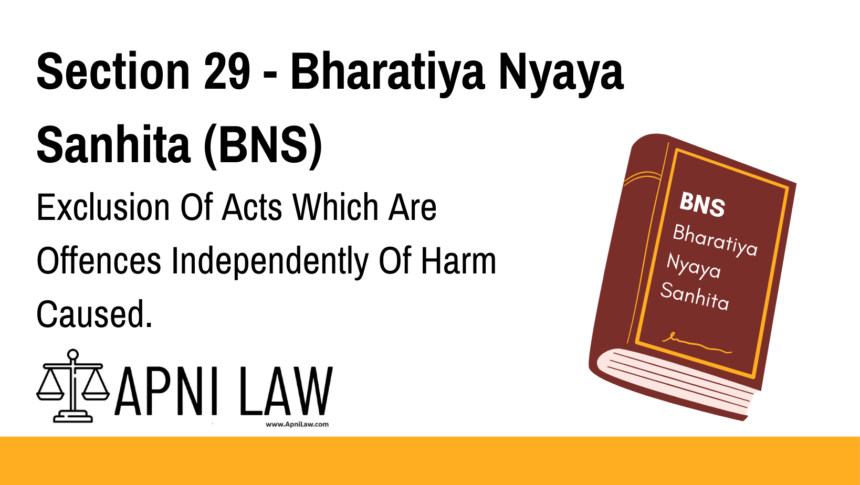Code: Section 29 BNS
Section 29
The exceptions in sections 25, 26 and 27 do not extend to acts which are offences
independently of any harm which they may cause, or be intended to cause, or be known to
be likely to cause, to the person giving the consent, or on whose behalf the consent is given.
Illustration.
Causing miscarriage (unless caused in good faith for the purpose of saving the life of the
woman) is an offence independently of any harm which it may cause or be intended to cause to
the woman. Therefore, it is not an offence “by reason of such harm”; and the consent of the
woman or of her guardian to the causing of such miscarriage does not justify the act.
Explanation of Section 29 BNS
Section 29 of the Bharatiya Nyaya Sanhita (BNS), 2023 clarifies that:
✅ Some acts remain criminal offences, even if they are done with consent or in good faith.
✅ These acts are illegal independently, meaning their criminality does not depend on the harm caused.
✅ The exceptions under Sections 25, 26, and 27 do not provide immunity for such acts.
Key Takeaways:
✔️ Criminal acts remain punishable, regardless of harm or consent.
✔️ Good faith or consent does not justify such offences.
✔️ The law protects individuals from giving consent to acts that are illegal by nature.
🔗 Related: Section 28 BNS – Consent Known to Be Given Under Fear or Misconception
Illustrations of Section 29 BNS
Example 1: Illegal Miscarriage (Abortion Without Legal Grounds)
A woman agrees to a miscarriage (abortion) that is not medically necessary. Since causing miscarriage is an offence unless done to save the woman’s life, her consent does not justify the act.
Example 2: Euthanasia (Assisted Suicide)
A person suffering from a terminal illness asks someone to end their life. Even though the person consents, euthanasia remains a punishable offence under Indian law.
Example 3: Organ Trafficking
A man voluntarily sells his kidney for money. Even though he gave consent, organ trafficking remains an independent criminal offence.
Example 4: Physical Assault in the Name of Tradition
A religious sect follows a practice where devotees voluntarily endure physical harm. Even though they consent, any serious bodily injury remains an offence.
🔗 Related: Section 30 BNS – Acts Not Intended to Cause Death
Common Questions & Answers on Section 29 BNS
1. Can consent make an illegal act legal?
🚫 No. If an act is an offence independently of harm, consent does not legalize it.
2. Does good faith protect a person from punishment under this section?
🚫 No. If the act is a recognized offence, good faith does not provide immunity.
3. Can a person be punished even if no harm was caused?
✅ Yes. If an act is illegal by itself, the absence of harm does not make it legal.
4. What if a doctor performs an illegal abortion?
🚫 If the abortion is not necessary to save the woman’s life, it remains an offence, regardless of consent.
🔗 Also Read: Section 31 BNS – Acts Done in Good Faith for Public Benefit
Conclusion
Section 29 of the BNS, 2023 ensures that certain acts remain criminal offences, regardless of consent or harm caused. This provision safeguards individuals from exploitation and prevents misuse of consent in criminal activities.
📢 For more legal insights, visit ApniLaw! 🚀








